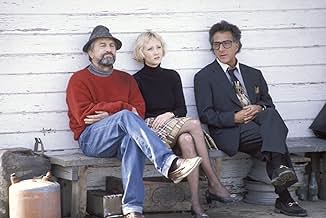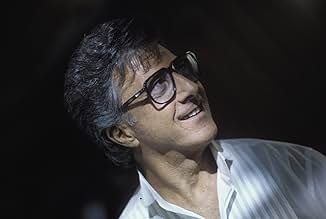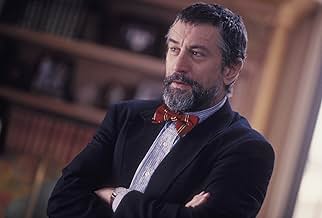PUNTUACIÓN EN IMDb
7,1/10
90 mil
TU PUNTUACIÓN
Justo antes de las elecciones, un consejero y un productor de Hollywood unen fuerzas para inventarse una guerra que servirá como cortina de humo de un escándalo presidencial.Justo antes de las elecciones, un consejero y un productor de Hollywood unen fuerzas para inventarse una guerra que servirá como cortina de humo de un escándalo presidencial.Justo antes de las elecciones, un consejero y un productor de Hollywood unen fuerzas para inventarse una guerra que servirá como cortina de humo de un escándalo presidencial.
- Nominado para 2 premios Óscar
- 2 premios y 23 nominaciones en total
Argumento
¿Sabías que...?
- Curiosidades"Why change horses midstream?" was originally a campaign slogan for Abraham Lincoln during the Civil War.
- PifiasWhen the coffin is unloaded from the aircraft, the flag is positioned properly, with the blue field over the decedent's left shoulder. At the memorial service, the blue is over the decedent's right shoulder.
- Citas
[Repeated line]
Stanley Motss: This is NOTHING.
- Créditos adicionales"Special Thanks to The Cast and Crew for Completing Principal Photography in 29 Days!"
- Banda sonoraThank Heaven for Little Girls
Written by Alan Jay Lerner and Frederick Loewe
Performed by Maurice Chevalier
Heard sarcastically during TV spot accusing the President of sexually exploiting an underage girl
Reseña destacada
I saw this before the brouhaha with Clinton and Lewinsky broke, and I imagine most of the negative comments about this film came because they saw it after and thought this was a Nostradamus film. When I saw it, I thought it started a bit slow, and was a bit too self-satisfied (like the scenes of people crying at a concert; that seemed fake). However, for most of the way, this is sharp, biting, and yes, funny, though when I first saw it, I thought it was more accurate in its Hollywood satire than on its government satire. Time, of course, proved me wrong.
David Mamet will never be universally loved, because not only does there seem to be a large group that doesn't get him, but that thinks those of us that like him are degenerates. Myself, I happen to think he's one of the best playwrights and screenwriters working today (though I'm split so far on his novels). His writing may be highly stylized, but I guess I'm in tune to the rhythms of his dialogue. And he doesn't assume his audience is dumb; rather, he seeks to challenge them by asking you to come to your own conclusions, rather than hit you over the head. And he does that very well in this movie; at the beginning, we may think Conrad Brean and Stanley Motss are real sleazebags, but at the end, while we deplore the action they take of faking a war just for political ends, we can't quite dismiss them either.
Of course, a lot of that has to do with the performances of Robert DeNiro and Dustin Hoffman (Anne Heche is also a standout as Winnifred Ames, the increasingly bemused presidential aide). DeNiro seems at first like a teddy bear here, with his beard, his hat, and his bow tie, but he transfers the energy associated with his more volatile roles (TAXI DRIVER, RAGING BULL, GOODFELLAS et al) to guile and street smarts here. The way his eyes probe whoever he's talking to, and the way he anticipates almost every verbal comeback the other person has demonstrates that(he can't anticipate every event, of course, but once he gets used to it, he can).
But the standout here is Hoffman. There's been a lot of comment on Hoffman basing his character on Robert Evans. My own theory is he read Lynda Obst's excellent book HELLO, HE LIED, which talks about the producer's role, and simply played that. I formed that theory because of his mantra whenever things go wrong, "This is nothing!", especially when Winnifred reads him the riot act after their plane crashes. There's a part in the book where Obst talks about having to argue budget with the studio, and realizes it's all a game where they have roles to play; she argues for more money, the studio for less. Just as Winnifred's role is to be pessimistic, and Stanley's is to be optimistic. And Hoffman never condescends to Stanley, instead showing a talented, maybe amoral guy who deep down is so insecure that he values credit even over his life("F*** my life, I want the credit!" is one of the best lines of the film"). Contrary to his line, this film is not nothing.
David Mamet will never be universally loved, because not only does there seem to be a large group that doesn't get him, but that thinks those of us that like him are degenerates. Myself, I happen to think he's one of the best playwrights and screenwriters working today (though I'm split so far on his novels). His writing may be highly stylized, but I guess I'm in tune to the rhythms of his dialogue. And he doesn't assume his audience is dumb; rather, he seeks to challenge them by asking you to come to your own conclusions, rather than hit you over the head. And he does that very well in this movie; at the beginning, we may think Conrad Brean and Stanley Motss are real sleazebags, but at the end, while we deplore the action they take of faking a war just for political ends, we can't quite dismiss them either.
Of course, a lot of that has to do with the performances of Robert DeNiro and Dustin Hoffman (Anne Heche is also a standout as Winnifred Ames, the increasingly bemused presidential aide). DeNiro seems at first like a teddy bear here, with his beard, his hat, and his bow tie, but he transfers the energy associated with his more volatile roles (TAXI DRIVER, RAGING BULL, GOODFELLAS et al) to guile and street smarts here. The way his eyes probe whoever he's talking to, and the way he anticipates almost every verbal comeback the other person has demonstrates that(he can't anticipate every event, of course, but once he gets used to it, he can).
But the standout here is Hoffman. There's been a lot of comment on Hoffman basing his character on Robert Evans. My own theory is he read Lynda Obst's excellent book HELLO, HE LIED, which talks about the producer's role, and simply played that. I formed that theory because of his mantra whenever things go wrong, "This is nothing!", especially when Winnifred reads him the riot act after their plane crashes. There's a part in the book where Obst talks about having to argue budget with the studio, and realizes it's all a game where they have roles to play; she argues for more money, the studio for less. Just as Winnifred's role is to be pessimistic, and Stanley's is to be optimistic. And Hoffman never condescends to Stanley, instead showing a talented, maybe amoral guy who deep down is so insecure that he values credit even over his life("F*** my life, I want the credit!" is one of the best lines of the film"). Contrary to his line, this film is not nothing.
- SKG-2
- 28 feb 1999
- Enlace permanente
Selecciones populares
Inicia sesión para calificar y añadir a tu lista para recibir recomendaciones personalizadas
- How long is Wag the Dog?Con tecnología de Alexa
Detalles
- Fecha de lanzamiento
- País de origen
- Sitio oficial
- Idiomas
- Títulos en diferentes países
- La cortina de fum
- Localizaciones del rodaje
- Main Drain Rd., Buttonwillow, California, Estados Unidos(Atwood Barker Market Scene)
- Empresas productoras
- Ver más compañías en los créditos en IMDbPro
Taquilla
- Presupuesto
- 15.000.000 US$ (estimación)
- Recaudación en Estados Unidos y Canadá
- 43.061.945 US$
- Fin de semana de estreno en EE. UU. y Canadá
- 92.079 US$
- 28 dic 1997
- Recaudación en todo el mundo
- 64.256.513 US$
- Duración1 hora 37 minutos
- Color
- Mezcla de sonido
- Relación de aspecto
- 1.85 : 1
Contribuir a esta página
Sugerir un cambio o añadir el contenido que falta

Principal laguna de datos
By what name was La cortina de humo (1997) officially released in Japan in Japanese?
Responde




































